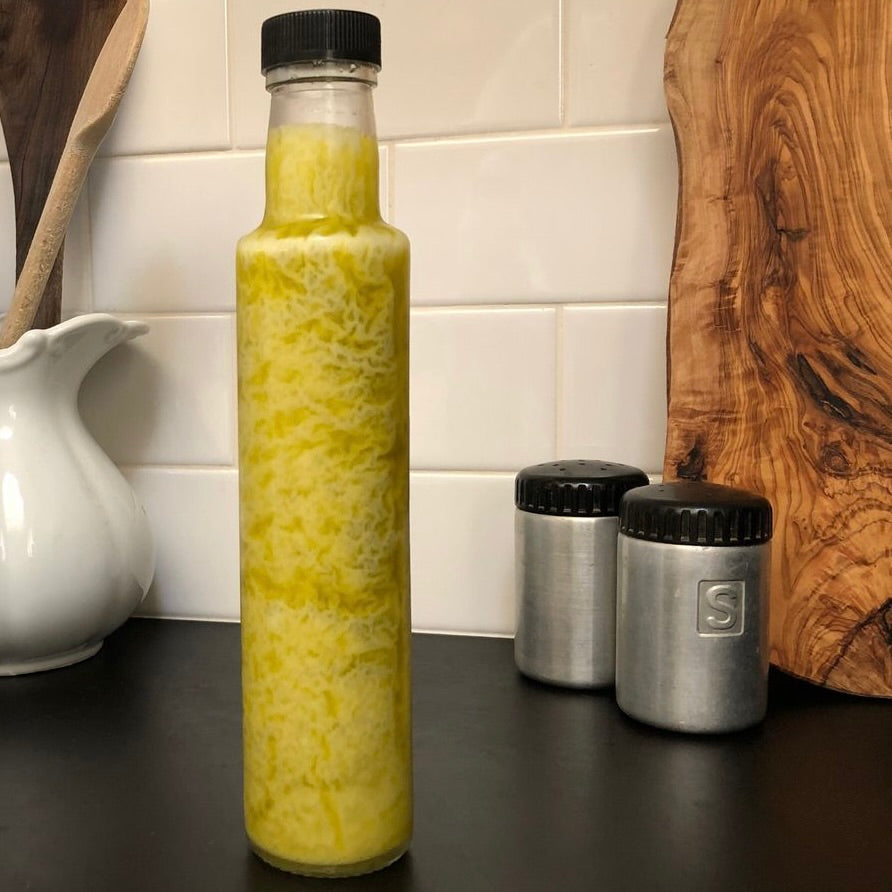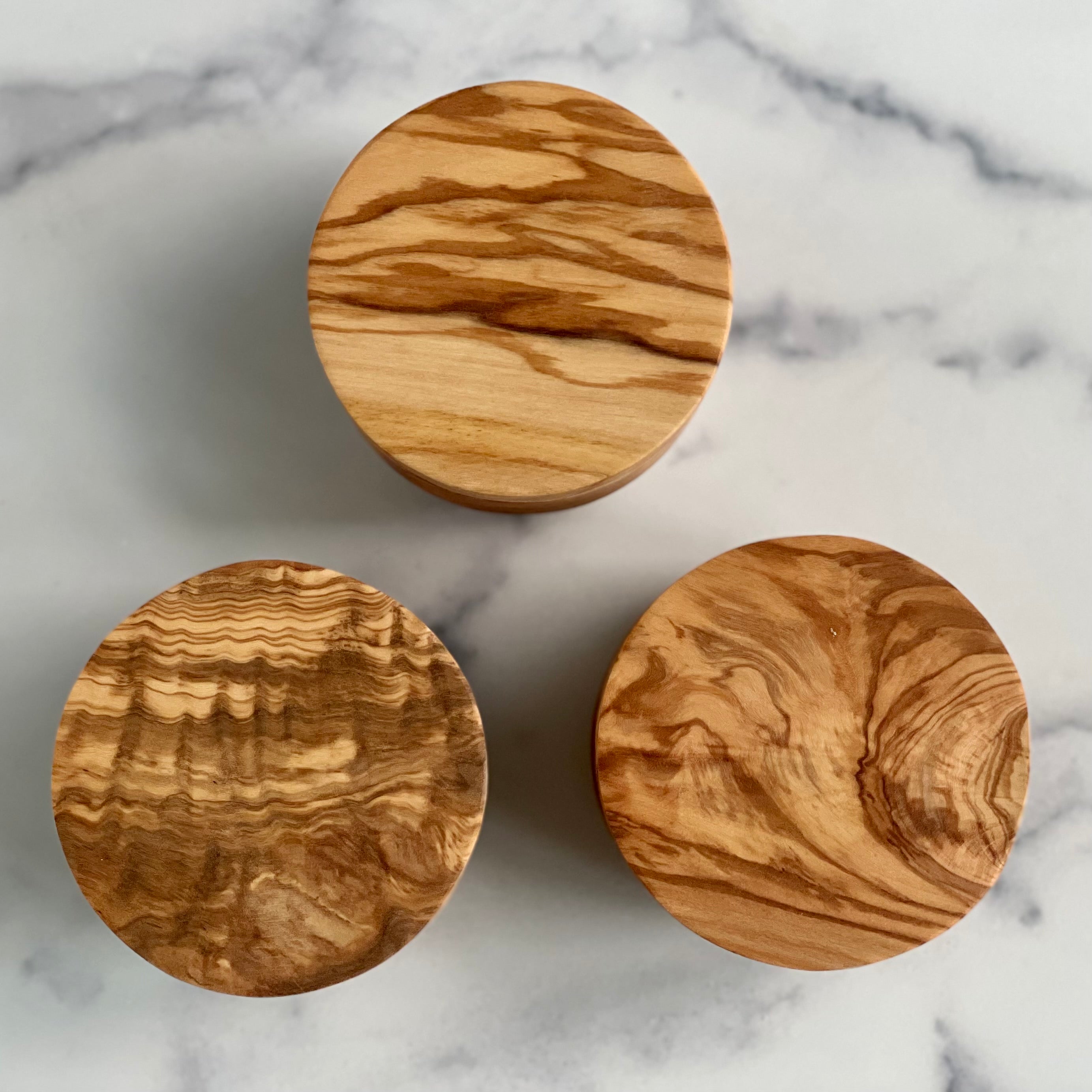
Frozen Olive Oil? Get the Facts.
Why is my olive oil congealed?
What is floating in my olive oil and why is there a film on top? My olive oil is chunky...it is okay? My olive oil looks frozen, will that affect the taste?
It is this time of year when we experience the oddity of congealed olive oil. I had a recent sample shipment arrive here after traveling through temperatures in the 45ºF range, and thought of all of you who might be receiving olive oil which has been transported through or into low temperatures.
Whether you have more "moderate" temperatures in the high 30ºFs or sub zero, you will experience congealed olive oil and, yes, it is still okay to use.
Here is a thoughtful essay about the topic by my colleague Alexandra, republished with permission.
____________________________________
If olive oil gets cold enough, then yes, it will freeze. But most of time, what you are seeing isn't frozen olive oil, it's just...chilly oil. Oh, and we'll explain why Dr. Oz was totally wrong.
At what temperature does olive oil solidify?
Olive oil can begin to solidify at temperatures starting around 54 degrees Fahrenheit (12ºC). Because olive oil is a natural product, an exact temperature is impossible to cite because it can vary a lot. Refrigerator temperatures are usually around 40ºF, so this is cold enough to make most olive oil start to solidify. Put olive oil in a freezer that is at the recommended temperature of 0ºF and you will definitely end up with an olive oil ice cube; the actual freezing point of olive oil is reported to be around 10ºF (more about possible reasons for freezing olive oil later). Occasionally olive oil will be subjected to actual freezing temperatures accidentally, but it's more common for it to encounter refrigerator-ish temperatures (in trucking during the winter, for example).
So what are those chunky bits in cold olive oil?
When olive oil gets cold, some of the triacylglycerols (three fatty acids on a glycerol "backbone") start to solidify. There are also naturally occurring waxes in olive oil that come from the skin of the olive that harden at low temperatures. As olive oil cools, these things cause cloudiness and/or form crystals, (aka chunky bits). The temperature when these crystals start to form will vary tremendously depending on the individual olive oil and its chemistry. This is affected by the olive variety, harvest maturity, growing climate and other factors.
What's with Dr Oz?
A few years ago Dr. Oz declared that it was possible to determine the quality of olive oil by putting it in the fridge. If it solidified, went the theory, it's extra virgin olive oil. If it remains liquid, it's not extra virgin. Unfortunately, that is utterly wrong. The things that cause olive oil to solidify are not indicative of extra virgin quality. The photo below graphically illustrates just how wrong this "fridge test" is.

The olive oil in this jug is 100% refined olive oil that was in a refrigerator at 40ºF. There is no extra virgin olive oil in it at all. As you can see, the olive oil in the jug is completely solid. Indicator of olive oil grade or quality? Nope.
So how did Dr Oz get this so wrong? Possibly because of the practice known as "winterization" for cooking oils. This process involves slowly cooling an oil until those triacylglyerols and waxes start to crystalize and then filtering or centrifuging them out. Canola and other common cooking oils as well as refined olive oil are often winterized. The process is essential for vegetable oil that will end up in commercial mayonnaise, for example, since the crystallizing due to cold can break the emulsion and cause the mayo to separate. This winterizing process is what allows some oils—including some olive oils—to remain liquid and clear at refrigerator temperatures.
Keeping olive oil in the refrigerator
Keeping olive oil in the refrigerator is generally not recommended. First, it's inconvenient. In order to use the oil, you need to put it at room temperature for quite a while until the chunky bits warm up and disappear—which they will. This is good to know if you ever have an accidentally chilled bottle of olive oil: leave it at room temperature and it will liquify. The quicker alternative is to put the bottle of olive oil in a dish of warm water, but we know that our olive oil will maintain its quality better if it's kept cool, so that is not recommended. Second, the repeated warming and cooling of the bottle can cause condensation inside, and you never want moisture in your olive oil. So for storage, cellar temperatures in the high 50s/low 60sºF are ideal.
All this said, oxidation does slow with cooler temperatures so refrigeration will extend the life of the oil. So if you have some fabulous extra virgin olive oil in your cupboard and you are going on vacation for a month in August, sticking that bottle in the fridge would be a good idea. Once you get home you'll take the bottle out, let it sit at room temperature for a while, and slosh it into your salad dressing. A rule of thumb: if you are worrying that much about keeping a bottle of olive oil fresh, you probably need to buy smaller bottles and/or ramp up your consumption!

Can I freeze olive oil?
So to come back to where we started, what are the reasons you might want to freeze olive oil? The most common reason is to preserve fresh herbs in a convenient form. By mixing olive oil with those chopped fresh herbs you can make frozen cubes to toss into your dishes as needed—a homemade convenience food! If your freezer is at the correct temperature of 0ºF, you will effortlessly end up with herby olive oil ice cubes that can be unmolded and kept in freezer bags.
There's another reason you might play around with freezing olive oil. In a small informal experiment, the author froze a freshly-made olio nuovo [aka Olio Novello or "new oil"] to see if it maintained its special character. Olio nuovo is distinctive in flavor, having high pepperiness, and a very bright, green olive character. Normally the shelf life of these products is less than 6 months. An identical sample of oil was placed in cool, dark cellar conditions (~60ºF). After six months the two samples were presented blind to a trained taste panel. Both oils were found to be extra virgin quality, but the frozen sample scored much higher for freshness and green characteristics. Interestingly, after only a few weeks, the difference in flavor between the two samples had disappeared. So if you want to experiment with freezing super-fresh olio nuovo to enjoy later, put it into an ice cube tray. Then you can thaw small quantities quickly and easily to add harvest-fresh flavor to your meal anytime!
Attribution
This article, "Does Olive Oil Freeze? Get the Facts" was written by Alexandra Kicenik Devarenne and originally published on a specialty olive oil website on 14 September 2021 and republished on 12/22/22 here at American Olive Farmer and updated 2/23/24.
All words and photos are the work of Ms. Devarenne and are republished here with the author's permission. Alexandra Kicenik Devarenne is a long time colleague of Liz Tagami. She is an olive oil consultant, writer, educator, and international olive oil judge based in California.





